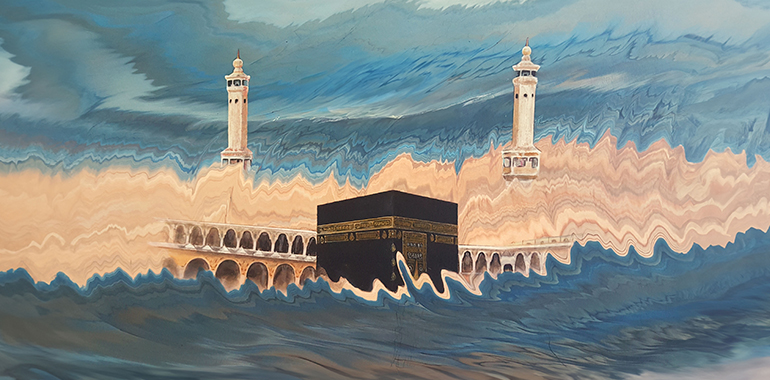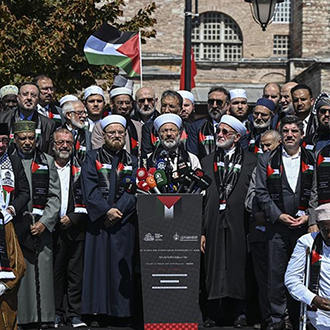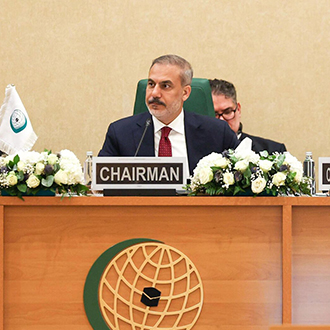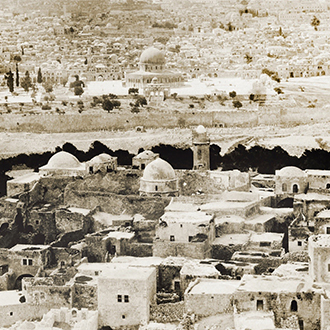They replied in unison: “Yes, we would believe you, for we have never known you to lie.” Thereupon, our Prophet told them: “Then know that I am warning you of a great punishment that you will suffer unless you believe in Allah and worship Him appropriately. He has commanded me to invite my close family to Islam. My assistance will be of no benefit to you in this world or the Hereafter unless you accept ‘La ilaha illallah’ (There is no deity worthy of worship except Allah).
His uncle, Abu Lahab, who was present among those who heard the Prophet’s declaration once again opposed the Prophet with harsh and unscrupulous words and attempted to hinder his meeting with the people of Mecca, seeking to prevent him from explaining Islam.
Reasons why the polytheists of Mecca opposed the invitation
The notables of Quraysh did not object to our Prophet’s invitation to Islam at first. But everything started to change when the Prophet (saw) recited verses criticizing idolatry and announced, after his open invitation to Islam, that idolaters would face the consequences of Hell. This message was seen as a significant threat, leading to a hostile attitude among the idolaters who sought to actively hinder the spread of Islam. There were various reasons behind their opposition.
Religious reasons
The Arabs were deeply attached to the traditions of their ancestors, and idolatry was among these deeply ingrained traditions that they unquestionably accepted. When Prophet Muhammad called them to worship the One and Only God, they reacted by saying, “Are you asking us to abandon the religion of our ancestors? We will not forsake the religion of our fathers.” Islam, on the other hand, rejected all forms of idol worship and commanded that only Allah be worshiped. Furthermore, the moral standards of the Quraysh, the tribe of the Prophet, were far from the ethical principles advocated by Islam. Islam did not condone many of the vices and negative practices that were prevalent in society. Islam, which called upon individuals and society to belief on the basis of one Allah, declared war on any and all systemic and social injustice.
Islam indeed challenged the prevailing notion of superiority based on wealth, lineage, or social status. It prohibited harmful practices and vices such as arrogance, gambling, adultery, drinking, and lying. Islam completely overturned the standards of people’s superiority over each other. In Islam, true superiority could only be attained through worship of Allah (taqwa). Islam proclaimed that there was no distinction between a slave and a wealthy person in the sıght of Allah. Both were regarded as equals, with their worth determined solely by their piety and submission to Allah. It seemed almost impossible for the notables of the Meccan polytheists to accept this understanding of equality.
Political and economic reasons
It was very difficult for individuals in Arab society, who attached great importance to tribal ties, to embrace a new religion. Doing so meant risking social ostracism, isolation, and being abandoned by their tribe, leaving them without any protection. Moreover, the tribes that made up the Arab society wanted their leaders to be wealthy and influential.
However, when Muhammad was born his father had already passed on, and during his early childhood, his mother also passed on, making him an orphan. Moreover, he did not possess any wealth either. Abu Jahl, one of the leading enemies of Islam, expressed his stance towards the Prophet by the following statement, “We can compete with the Hashimites. Whatever they do, we can do the same. But now they say, ‘A prophet has come to us, to whom revelation was sent’. How can our tribe produce a prophet of such kind? By Allah, we will never accept this prophethood.”
Yet, the call of Islam, initiated by our Prophet began to transform hearts. However, the wealthy and powerful elites in Mecca were primarily concerned with their property and status rather than matters of the heart. They desired the preservation of the existing economic and idolatrous order without any alteration.
Another significant factor was the influx of people from various regions across the Arabian Peninsula to Mecca, which served as a prominent hub for trade and religious activities. The polytheists held great reverence for the multitude of idols housed in the Ka‘bah. Additionally, the Meccans profited by selling these idols to outsiders. The polytheists of Mecca were concerned that the advent of Islam would diminish the economic prosperity they derived from these idols. Naturally, this was a scenario they vehemently opposed. Consequently, they commenced devising and implementing strategies to halt the advancement of Islam.
Efforts to hinder the invitation of Prophet Muhammad
The number of believers in our Prophet began to grow, prompting the Quraysh to employ tactics to impede this progress. They resorted to contempt, insults, and even violence to achieve their goal. In addition to these actions, the Quraysh made peculiar requests of Prophet Muhammad. For example, they asked our Prophet to make rivers flow through Mecca, to resurrect their deceased ancestors, bestow upon them grand palaces and treasures, and even inflict punishment upon themselves. In response to these bizarre demands, the Prophet conveyed that everything would come to pass according to the will of Allah, emphasizing, “I am merely a prophet chosen by Allah from among the people.”
Mockery and slander
When the number of believers in Islam conveyed by Prophet Muhammad (saw), who lived his entire life with utmost sincerity, began to increase, the Quraysh polytheists resorted to a new tactic of mockery. They started labeling him as a soothsayer, a madman, and even a poet. Furthermore, they sought to undermine and refute Islam and the Qur’an by claiming that the Qur’an was a fictitious work, invented by the Prophet Muhammad or that he learned it from a Christian source. In a nutshell, they wanted to undermine Islam by claiming that the Qur’an is not the word of Allah. Undoubtedly, this campaign of slander and falsehood deeply affected our Prophet. However, Allah reassured him and those who believed in him through the revelation of verses that challenged the polytheists until the Day of Judgement. Allah addressed the Prophet with the following verses, “Then declare what you are commanded and turn away from the polytheists. Indeed, We are sufficient for you against the mockers who make (equal) with Allah another deity. But they are going to know.” (Hijr, 15:94-96), and “Or do they say, ‘He invented it?’ Say, ‘Then bring ten surahs like it that have been invented and call upon [for assistance] whomever you can besides Allah, if you should be truthful.’ And if they do not respond to you - then know that it [the Qur’an] was revealed with the knowledge of Allah and that there is no deity except Him. Then, would you [not] be Muslims?” (Hud, 11:13- 14) Despite the pain caused by these slanders and lies, the Prophet found solace in the support and guidance of Allah.
The proposal of an agreement between the polytheists and the Prophet
When Prophet Muhammad persevered in inviting people to Islam despite facing all kinds of ridicule and insults, the polytheists sought to discourage him by proposing an agreement with him. The person to come to him with the proposition was Utbah. He approached the Prophet and said, “If your aim is wealth, let us give you property. If you seek rank and reputation, we will make you our leader”, and he went even further and said, “If you are suffering from a mental illness, we will provide treatment for you.”
After Utbah had spoken these words, our Prophet recited the first verses of Surah Fussilat (41:1-6) and affirmed that he was a prophet appointed by Allah. Realizing that their worldly offers could not sway Prophet Muhammad from his mission, they made a new offer. This was a rather strange proposition, for they said, “O Muhammad! Let us worship what you worship. And you can worship the idols that we worship”. In response to this inappropriate proposition of the polytheists, Surah al-Kafirun was revealed: “Say, ‘O disbelievers, I do not worship what you worship. Nor are you worshipers of what I worship. Nor will I be a worshiper of what you worship. Nor will you be worshipers of what I worship. For you is your religion, and for me is my religion.’” (Kafirun, 109:1-6)









